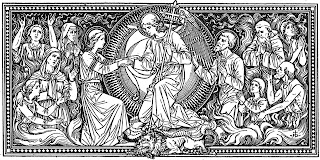HOLY
FAMILY OF JESUS, JOSEPH, AND MARY SUNDAY
Sir.3:2-6,12-14; Ps.105; Col.3:12-17; Lk.2:22-40
How is
your family today? Before, at exactly six in the evening, children are at home
to pray the angelus. Today, at 6pm, children leave home for some “la vida noche.” Before, over dinner,
parents and children are busy not just eating but also sharing one another’s
experiences. Today, during dinner, it’s either the television set or the
keypads of cellphones which are very noisy. Before, it’s more fun in the
Filipino family because siblings, cousins, nieces, and nephews live together.
Today, it’s better to be alone than to be with the irresponsible husband or
unfaithful wife. How is your family today?
Today,
Holy Mother Church is celebrating Holy Family Sunday. We remember that simple
and lowly family of Jesus, Joseph, and Mary. If we read the Lukan infancy
narratives, we see the “nothingness” of such family. They have no horse for
travel but a donkey. They have no room to lay down the child but a manger. They
have no royal visitors but simple shepherds. However, such “nothingness”
continues until today the shining and shimmering model for all families. Thus,
being aware of the shifting values and diminishing family virtues, let us learn
today from the family at Nazareth!
In our
Gospel, we heard Joseph and Mary brought Jesus to the Temple to be presented to
the Lord “in accordance with the dictate
in the law of the Lord.” Jesus was offered back to where he truly belongs –
to God, the Most High. This is therefore our first step in order to strengthen
our families – to offer them back to God. We become a family not purely because
of our own making. God blessed such union in the sacrament of marriage and
graced such coming together with the gift of children. Just as Jesus was
brought to the Temple, let us bring our families to God through prayer.
Sometimes, when family life becomes weary and burdensome, probably, it is
because we have forgotten to pray together. Fr. Payton’s words remain true
until today, “The family that prays together, stays together.”
The
Catholic Church teaches that the family is an “image of the Trinity.” And who
is this Trinity? It is a “community of life and love.” Thus, our families, too,
are communities of life and love.” The family becomes a mere organization when
it ceases to become a haven of life and love. Love is the binding force that
gives life in every family. Take away love, then everything else will crumble
and shatter into broken pieces of anger, hatred, and indifference. How are we
to show such life – giving love? Our first and second readings today give us a
rich list of “expressions of family loving.” Sirach reminds children to honor
and take care of their fathers and mothers because “he stores up riches who reveres his mother…he who obeys his father
brings comfort to his mother.” St. Paul reminds us to “put on, as God’s chosen ones, holy and beloved, heartfelt compassion, kindness, humility,
gentleness, and patience, bearing
with one another and forgiving one another, if one has a grievance against
another; as the Lord has forgiven you, so must you also do.And over all these
put on love, that is, the bond of perfection.”
In this
Holy Family Sunday, let us remind our own families that we are “Christian”
families! Hence, let us offer ourselves back to God through prayer and practice
within our families the many “expressions of love.”
After
blessing the house of a poor family, the father gave me an envelope for my
stipend. Seeing the difficult situation at home, I returned the envelope back
to him as my fiesta gift for the family. However, the father told me to keep
the envelope. He said, “Rev., please keep the envelope with you. Though it is
only a small amount, it is our way of thanking God and San Roque for
continuously sending to my family his blessings. Despite our poverty, all my
fourteen children are in school. Despite our difficulty, we are still able to
eat three times a day.” How about you? How is your family today?

